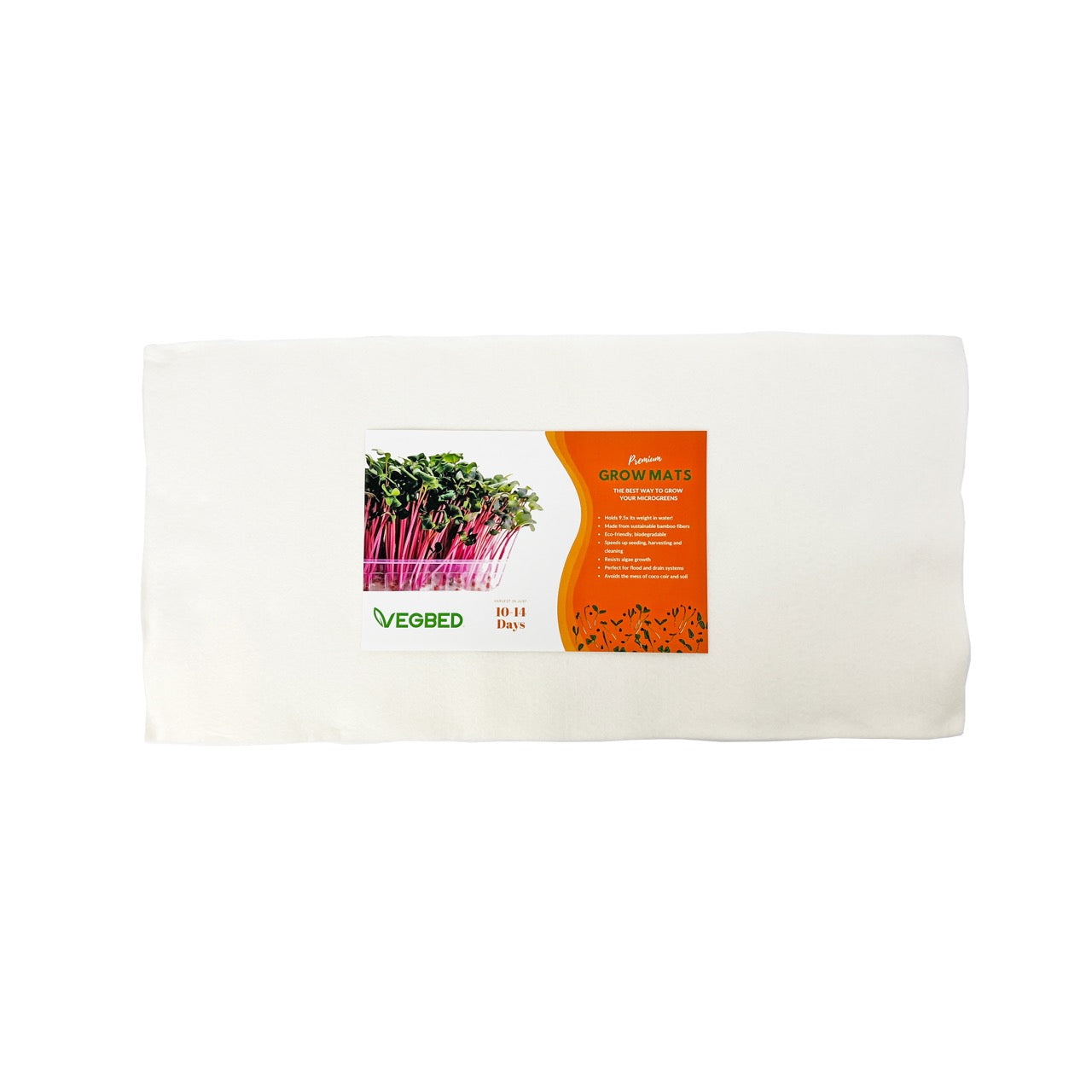Let's delve deeper into the two key pillars of sustainable microgreen farming: soilless cultivation and water conservation.
Ditch the Dirt: Embracing Soilless Growing
Traditional agriculture often relies heavily on soil, a vital but vulnerable resource susceptible to erosion, depletion, and pollution. Microgreens, however, thrive in soilless growing mediums, offering several environmental advantages:Championing Renewables: Vegbed's bamboo grow mats, for example, are crafted from a fast-growing, renewable resource. Bamboo doesn't require vast tracts of land for cultivation and replenishes itself quickly, unlike peat moss, a common soilless medium with environmental concerns surrounding its harvesting practices.
Waste Not, Want Not: Soilless cultivation minimizes the need for peat moss, contributing to a reduction in waste. Additionally, it eliminates the potential for soil-borne diseases, which can lead to spoilage and wasted resources.
Promoting Hygiene: Traditional soil-based methods can harbor harmful pathogens. Soilless mediums like bamboo mats offer a cleaner growing environment, potentially reducing the need for chemical pesticides, which can harm beneficial insects and pollute waterways.
Every Drop Counts: Water Conservation in Microgreen Farming
Microgreens are champions of water conservation, requiring significantly less water compared to traditional agriculture. Here's how they achieved this remarkable feat:Shallow Root Systems: Microgreens develop shallow root systems with minimal water storage capacity, leading to efficient water uptake and less overall water needed compared to deep-rooted plants.
Precise Watering: Soilless mediums like bamboo mats offer superior drainage, preventing waterlogging and allowing for controlled irrigation. Techniques like drip irrigation systems deliver water directly to the root zone, minimizing evaporation and further reducing water waste.
Speedy Sprouts: The rapid growth cycle of microgreens, typically 7-14 days, translates to a smaller water footprint compared to crops with longer growing seasons that require sustained irrigation over extended periods.
Beyond Minimizing Impact: The Positive Side of Sustainability
Sustainable microgreens farming isn't just about reducing environmental impact; it actively contributes to positive ecological outcomes:Shrinking the Carbon Footprint: By minimizing resource use and transportation needs, sustainable microgreen farming contributes to a lower carbon footprint. Locally grown microgreens require less transportation compared to produce shipped long distances, further reducing greenhouse gas emissions.
Local Food Systems: Microgreens can be grown indoors year-round, promoting local production and fostering shorter supply chains. This reduces reliance on long-distance transportation and supports local economies.
Urban Agriculture Potential: Soilless microgreen cultivation removes the limitations of traditional farming. It makes it possible to grow fresh produce even in urban settings with limited space, promoting urban agriculture and fostering a connection between consumers and their food source.
Taking Action: Contributing to a Greener Future
By incorporating sustainable practices like soilless cultivation and water conservation, microgreen farming paves the way for a more eco-friendly food system. As informed consumers, we can support this movement by:Seeking Sustainable Sources: Look for microgreen producers who prioritize sustainable practices and utilize soilless cultivation methods like bamboo grow mats.
Educate Yourself: Increase awareness about sustainable microgreen farming and its benefits for the environment. Sharing this knowledge with others can create a ripple effect.
Support Local Growers: Opt for locally grown microgreens whenever possible. This reduces the environmental cost associated with transportation and fosters a connection with your local food system.
Vegbed: Championing Sustainable Microgreens
At Vegbed, we're committed to providing sustainable solutions for microgreen growers. We offer bamboo grow mats designed to promote efficient water usage and minimize environmental impact. Explore our product and discover how you can cultivate flavorful microgreens with minimal environmental impact! Together, we can make a difference, one tiny sprout at a time.




